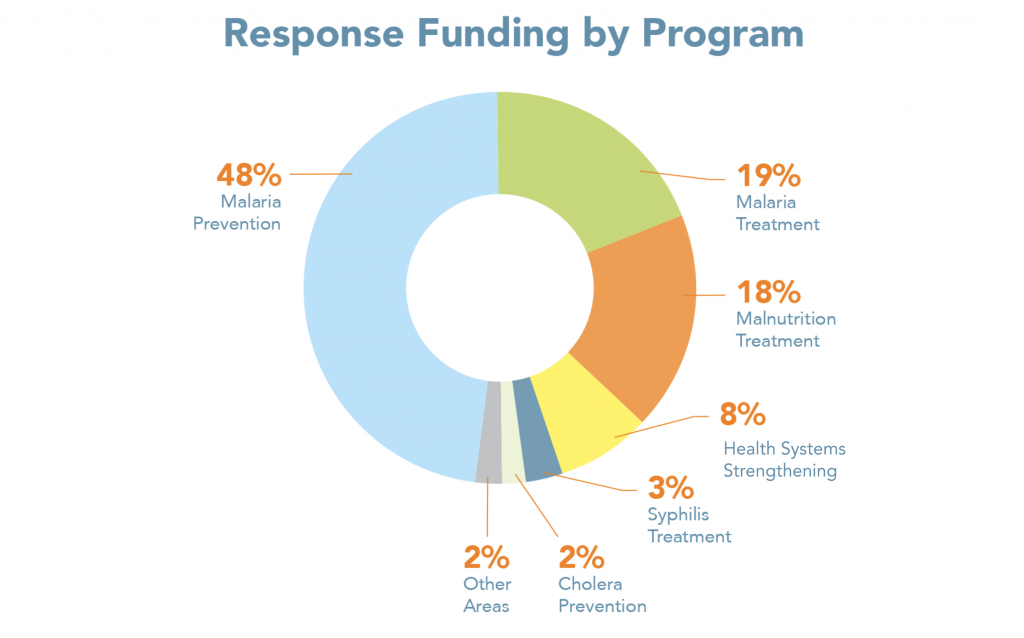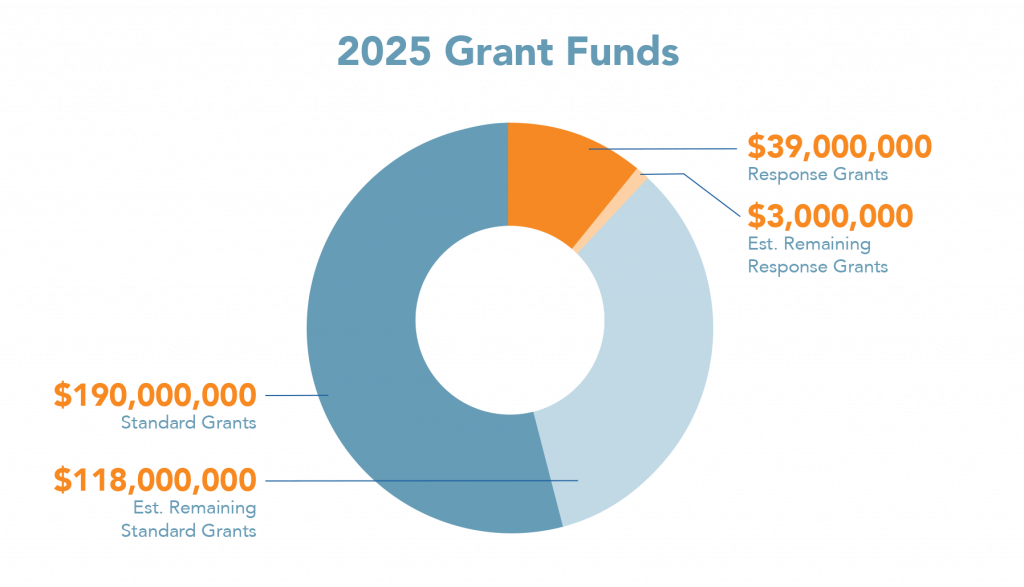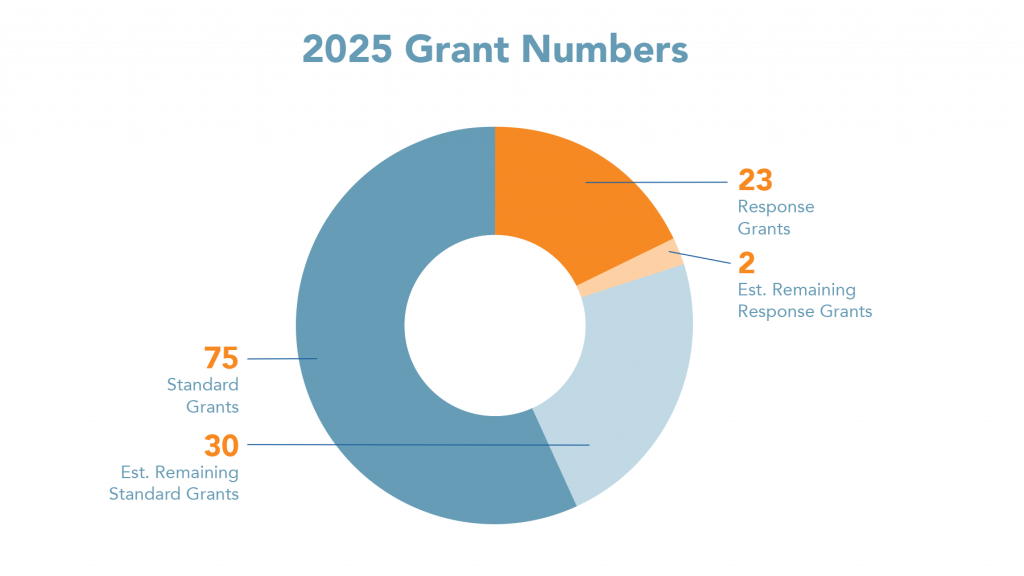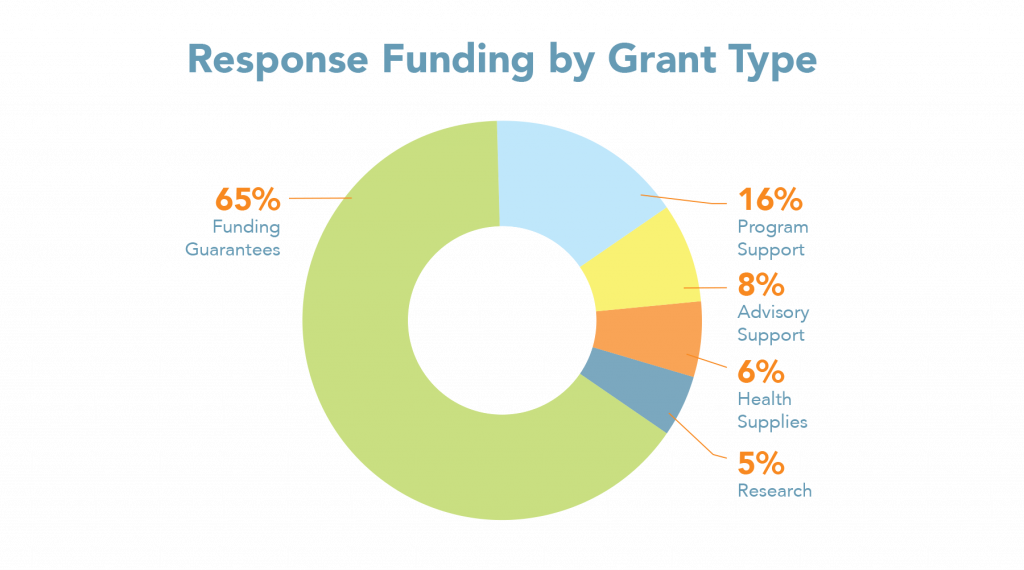It has been a tumultuous year for global health. In early 2025, the US government froze billions of dollars in foreign aid, affecting millions of people around the world and creating substantial uncertainty that continues to ripple through health and development programs.
Drawing on almost two decades of cost-effectiveness research and analysis, GiveWell assessed the effects in real time and identified funding gaps where donors’ contributions could have exceptional impact. Our actions were guided by our core principles:
- Search for highly cost-effective giving opportunities, even in uncertain circumstances.
- Rigorously evaluate those opportunities and share our research publicly, while acknowledging that timely action sometimes requires accepting higher uncertainty.
- Direct funds to where we think they’ll do the most good, considering both immediate needs and long-term implications.
Our response so far

In response to funding shortfalls, we funded time-sensitive opportunities to ensure that cost-effective programs could continue. And in response to substantial uncertainty and in expectation of growing needs, we engaged in efforts to research new areas and prepare ourselves for the future. You can read some examples of our response later in this post.
So far this year, we’ve made 98 grants, 23 of which directly address urgent and cost-effective needs created by the funding cuts. These grants represent around $39 million—just over 10 percent of the total funds we expect to direct this year. However, most of our research and the programs we fund have been affected by the cuts in some way.


How you can help
As the year comes to a close, we invite you to join us in doing the most good we can together. With fewer resources going to global health and development programs, we believe giving now has a greater potential impact than before the cuts. Donating to one of our giving funds enables us to direct it toward the best opportunities we find. We encourage you to donate to the one that makes the most sense for you, and we describe them in more detail below).
Funding time-sensitive opportunities

In order to have the greatest impact, we’ve focused our response to the funding cuts on addressing the most cost-effective opportunities we find rather than trying to replace lost funding more generally. The grants we’ve approved cover a variety of issue areas and approaches, such as funding guarantees, program support, advisory support for governments, health supplies, and research—as shown in the chart above and explained in more detail below.
Funding guarantees
The uncertainty caused by funding cuts disrupted many global health programs, and in some cases GiveWell funding guarantees were able to keep these programs moving forward. For example, in April 2025 we provided funding guarantees for seasonal malaria chemoprevention (SMC) campaigns in Benin, Cameroon, Côte d’Ivoire, Guinea, Mali, and Togo.
SMC is only delivered during a specific period each year when malaria transmission is highest (generally July to October). The campaigns require careful planning and preparation on a specified timeline to ensure that the drugs are ready to distribute during that window. The funding freeze that started in January jeopardized 2025 SMC campaigns in several countries because of the disruption to funding for pre-campaign planning activities. GiveWell guaranteed funding for those pre-campaign activities and campaigns themselves for certain countries if US government funds didn’t return.
Our guarantee enabled implementing organizations and governments to move forward with time-sensitive preparations while funding was uncertain. We provided some funding for pre-campaign activities in six countries and provided partial funding for the SMC campaign itself in one country, as the others had their US government funding reinstated in time. We think that some of those campaigns may not have taken place without our backstop support. For more on our response to aid cuts for SMC, listen to our recent podcast episode.
Program support
Disruptions to foreign assistance have also created significant obstacles for program implementation. For example, even if we choose to fund one component of a program, the program might remain inoperable if related elements were left unfunded—such as having malaria drugs but no distribution system or trained personnel to administer them. In other cases, funding for all elements of a program was discontinued.
In response to this problem, we have made some grants for programs where funding had been discontinued, and others to ensure that newly unfunded program elements related to our grants received necessary support. The latter was the case with our recent grant to Against Malaria Foundation (AMF) to support the distribution of 4.4 million insecticide-treated nets in Ituri province, Democratic Republic of the Congo (DRC), to prevent malaria. AMF typically procures the nets while relying on partners to fund the distribution. The nets for this campaign were procured through a GiveWell grant in December 2024, but no other funder committed to funding distribution logistics. In the absence of partner funding, this grant will cover all distribution costs including shipping, warehousing, distributor training, and household delivery. We estimate the campaign in Ituri, supported by an initial procurement grant and the subsequent distribution grant following this year’s aid cuts, will avert 5,700 additional deaths.
Health supplies
In other cases, distribution systems and personnel were available to implement cost-effective health programs, but funding for needed supplies was discontinued. We have made several grants to procure these health commodities. For example:
- GiveWell approved a grant to the Clinton Health Access Initiative (CHAI) to quickly procure and ship three million malaria rapid diagnostic tests (mRDTs) to public sector clinics in Nigeria. The goal of the grant is to reduce stockouts due to procurement and shipping delays that were caused by funding cuts.
- GiveWell approved a grant to PATH to purchase and ship approximately three months’ worth of injectable artesunate to Mozambique. Injectable artesunate is the first-line treatment for severe malaria, and we expect stock levels will start running low around December 2025 owing to reduced funding from the President’s Malaria Initiative for shipments.
Through grants like this, we are working to ensure that governments and implementing organizations are able to continue essential health services.
Advisory support for governments
GiveWell is also supporting countries in their efforts to navigate uncertainty and maintain essential health services as they triage, improve efficiency, and reallocate funds. We recently made grants to CHAI and PATH to provide technical support units (TSUs) to the Ministries of Health in Burkina Faso, DRC, Malawi, Nigeria, Uganda, and Zambia to support their government-led reform agendas in response to US government funding cuts.
The work is being led by each government, and the support will be tailored to their respective priorities. TSUs are teams of three to five people embedded in each country’s ministry to support governments’ planning and prioritization efforts. They help ministries assess funding gaps, identify cost-saving opportunities, analyze the cost-effectiveness of different programs, and develop strategies to secure additional funding sources. By creating in-depth analyses and evidence-based recommendations, TSUs enable ministries to make informed decisions quickly. For more on these grants, which were co-investigated and co-funded with Open Philanthropy, listen to our podcast episode.
Research
Funding for a number of global health trials was discontinued after research had started, making it unlikely that the research could be completed and potentially wasting time and effort. GiveWell closed several emergency funding gaps to ensure that this critical research continued as planned. For example:
- GiveWell recommended two grants to Population Services International (PSI) to complete the final round of physical and chemical durability testing on insecticide-treated nets distributed in Cameroon and Nigeria and to publish the findings. The first two survey rounds in both countries were funded by the President’s Malaria Initiative, which experienced significant funding cuts, and we believe that the final survey would not have been completed without GiveWell funding.
- In March 2025, GiveWell recommended a grant to Johns Hopkins University to fill an emergency funding gap for an ongoing randomized trial of the Cholera Hospital-Based Intervention for 7 Days (CHoBI7) in Bangladesh, following USAID’s termination of funding. At the point at which the grant was terminated, the trial had been running for six months; GiveWell funding will allow the research to be completed as originally planned.

GiveWell is providing funding in response to cuts in global health aid in 20 countries. Map created using MapChart.
Learning more and preparing for the future
Disruptions this year represent only a small portion of the potential impact of the funding cuts, and we’ve been preparing for the needs that could arise in the next few years due to sustained reductions in foreign assistance from the US and other donor countries. We are concerned that the worst effects may arrive over the next two years, as existing contracts end and the consequences of cuts to prevention programs mount. We want to ensure we remain well-positioned to find new exceptional opportunities to save and improve lives. So, alongside our ongoing efforts to find and fund highly cost-effective programs, we’ve been working to collect more data and information about the likely effects of the cuts.
Improving global health data
GiveWell’s ability to find and fund highly cost-effective health programs relies on a foundation of credible data, so we have been working to improve the data that we depend on. This effort has become more important as funding has been cut for key sources of global health data, such as the Demographic and Health Surveys (DHS) Program (discussed on this podcast episode). To ensure we have access to reliable, accurate data, GiveWell has been coordinating with other global health partners and making grants.
For example, in August 2025, GiveWell recommended a grant to the Johns Hopkins CA CODE (Child and Adolescent Causes of Death Estimation) team to produce state-level estimates of causes of death for children under five in Nigeria from 2000 to 2024. Nigeria receives substantial GiveWell funding across multiple states and health interventions, and we rely on cause-specific mortality estimates when evaluating these different programs.
Understanding the effect of funding cuts
By making grants, allocating research time, and talking with people who have been affected, GiveWell is developing a clearer picture of the impact of the cuts so we are prepared to respond effectively in the years ahead. Here are a few examples of this work:
- Learning grants. In April, we approved a grant to Results for Development to assess how US government funding cuts are impacting key parts of the vaccine delivery system in DRC, Madagascar, and Nigeria. This research addresses a critical lack of information about the real-world consequences of the cuts on vaccine delivery, including the effects on vaccinators, fixed-site and outreach sessions, supply chains, and data systems. We expect the findings to influence GiveWell’s vaccines strategy by providing qualitative updates to help us manage existing grants and prioritize future funding.
- Research efforts. Early this year, some of our researchers assessed how the cuts could affect long-term funding needs for key health interventions, including malaria and HIV/AIDS, and could potentially disrupt health systems. One group of researchers assessed aspects of health systems required for successful implementation of global health programs, like commodity supply chains and data management systems, and made recommendations for how GiveWell could respond. We also established a rapid response team to investigate promising, high-priority, and urgent opportunities.
- Site visits. While the bulk of GiveWell’s work is desk-based research, site visits add crucial on-the-ground context that raises important questions, challenges our assumptions, and makes our research stronger. For example, several members of GiveWell’s leadership team traveled to Malawi this summer, and one of their goals was to understand the effects of foreign aid cuts firsthand in a country that our research indicates may be particularly hard hit. To learn more about the insights and questions that will inform our future research, listen to our podcast miniseries on the site visit.
Our Giving Funds
Our community of donors determine what we’re able to fund in the future. By donating to our Giving Funds, you’ll be supporting high-impact, evidence-backed programs.
- Giving to our All Grants Fund provides us with more flexibility to respond strategically to the greatest emerging needs we identify. While we have less certainty about some of the individual programs supported by this fund, we think they collectively have the highest impact per dollar spent. All of your gift, after any fees by the payment processor, goes to support the best giving opportunities we find.
- Giving to our Top Charities Fund ensures your money is deployed quickly and exclusively to our Top Charities—highly cost-effective programs we have the most confidence in. All of your gift, after any fees by the payment processor, goes to support the best giving opportunities we find among our four Top Charities.
- Giving to our Unrestricted Fund provides us with maximum flexibility to better and more quickly respond to unexpected needs and opportunities—like recent cuts to global health aid—while continuing our core grantmaking work. Donations to this fund can be spent on any GiveWell priority, including grantmaking and our own operating expenses.
We’re grateful for your trust in our research and your partnership in saving and improving lives as much as we can!


Comments
In a N.Y. Times article on Dec 28, “How Cameroon Fought to Save Its Malaria Program After the U.S. Cut Critical Funding,” a Cameroon National Malaria Control Program’s coordinator called GiveWell “an angel from heaven.” But by far the most moving quote from that article was the response of an unpaid health worker when he was asked why he continues to work in his village without pay: “We are the people who save small children,” said Bachirou Agarbel, who was employed by P.M.I. in his village, Ginadji, since the start of the program. “Of course we had to keep doing the job.”